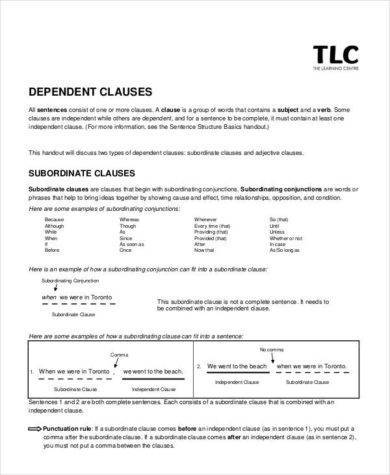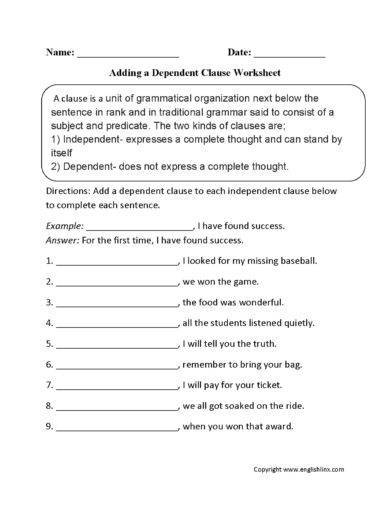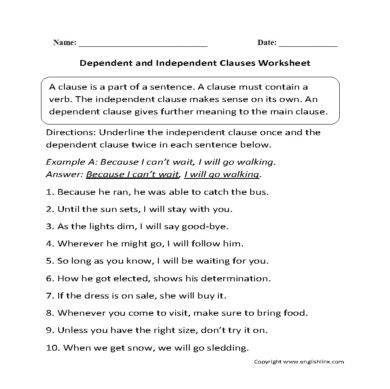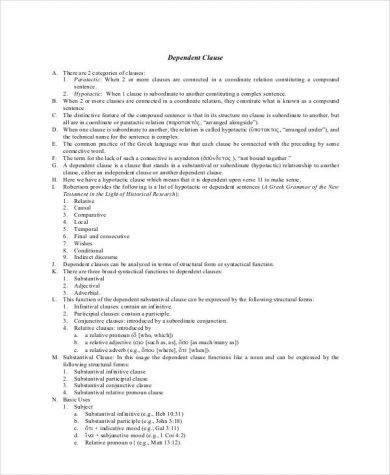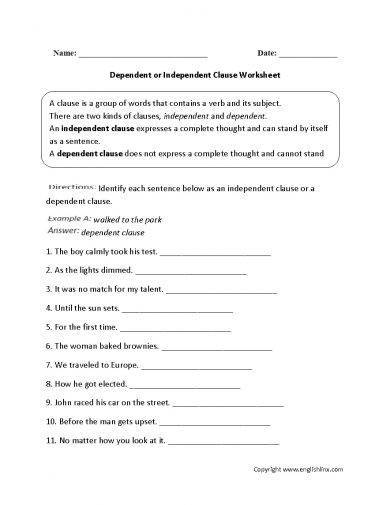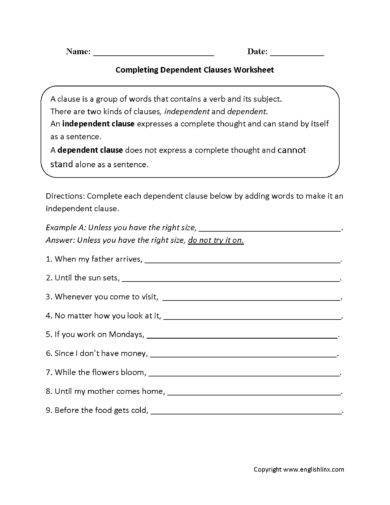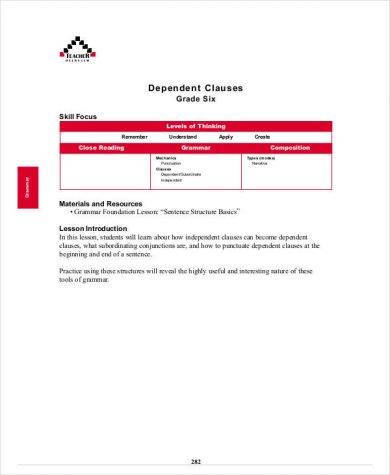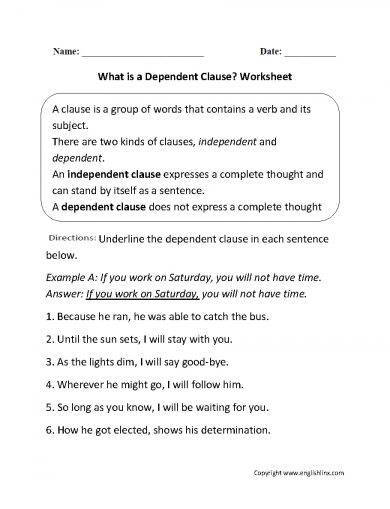6+ Dependent Clause Examples
Writing has become a huge part of our lives. We write sentences when we send emails to our bosses and colleagues (even to our own professors), when we send texts, develop papers for school or work, or even when we leave a note behind as a reminder or memo addressed to a specific person. You may also see what is an example of a dependent clause.
Written communication wouldn’t even exist if it wasn’t for the construction of these sentences. But for a sentence to be developed, what comprises one?
The answer to this question is really simple. Formal letters, general essays, paragraphs, and sentences all exist thanks to a group of words called clauses. In this article, we shall tackle the basics of one of the two types of clauses: the dependent clause.
Sample Dependent Clause
Adding Dependent Clauses Worksheet Example
Dependent and Independent Clause Worksheet Example
Understanding Dependent Clauses
These days, we often like to shorten our dialogues to acronyms or abbreviations of certain phrases or words. Although our personal lingo has made it easier to communicate with people who are like us, this has caused us to forget how to properly construct sentences that make actual sense. You may also like conditional sentence examples.
Now, imagine landing an interview for a college application at a prestigious university. But before you get to meet with the head of the department, they ask you to submit a college essay as a requirement. Naturally, you’d want to avoid committing any mistakes with your grammar and sentence structure. There’s nothing impressive about writing a one-page essay filled with simple sentences either. For this reason, it’s important to learn how you can vary your sentence structures for better delivery.
What Is a Clause?
All sentences are made up of one or more clauses, which can either form a simple sentence, a compound sentence, or a complex sentence. A clause is defined as a group of words consisting of a subject and a predicate. Keep in mind that the subject is the who or the what of the clause. The predicate, on the other hand, may contain a verb or a verb phrase that indicates the action.
A clause is generally divided into two types: an independent clause and a dependent clause. While an independent clause expresses a complete thought, a dependent clause does not convey a complete idea. In other words, a dependent clause cannot stand on its own, which is why it must be attached to one or more independent clauses to formulate a complete sentence.
Let’s take this for example:
because he injured his foot
The example given is considered to be a dependent clause because it only presents the effect of a situation and not its cause. Though it does contain a subject (he) and a verb (injured), the clause does not make any sense. This makes it difficult for a receiver to understand what the speaker is trying to say. You may also check out fused sentence examples.
Tristan won’t be able to join the marathon because he injured his foot.
By joining an independent clause and dependent clause together, it’s easier to comprehend what is being indicated in the sentence. A dependent clause usually contains a subordinating conjunction that also serves as an indicator that will let an audience know that something is expected to follow. You might be interested in examples of prepositional phrases.
Printable Dependent Clauses
Worksheet Example
Completing Dependent Clauses Worksheet Example
Types of Dependent Clause
There are three basic types of a dependent clause: the adjective clause, the adverbial clause, and the noun clause. Each clause is different from the other, and to know more about this, let’s take a closer look at each type:
1. Adjective Clause
When we think of adjectives, the first thing that comes to mind are the so-called describing words. An adjective clause, which may also be referred to as an adjectival clause or a relative clause, are a group of words that usually come after the noun it modifies. You may also see compound sentence usage and examples.
There are three traits that define an adjective clause:
- It begins with a relative pronoun (who, whom, whose, that, or which) or a relative adverb (when, where, or why). This is used to connect the clause to the noun it is modifying.
- It is comprised of a subject and a verb.
- It tells us something about the noun. You may also like cumulative sentence examples.
Examples:
- that I bought for him
- which is found in the Maldives
- who is talented
- whom we met after the concert ended
- whose writing will never fail to intrigue me
- when the leaves change colors and fall
- where I went to high school
- why the film was a hit
- that was a blockbuster
- who lives by the beach
In a sentence:
The movie that Jonathan recommended scared the children half to death.
2. Adverbial Clause
An adverbial clause functions exactly like a regular adverb. And since an adverbial clause does take the role of an adverb, then this means that it could also be broken down into several categories, namely the adverb of time, place, manner, degree or comparison, condition, concession, and reason. You may also check out parallel sentences structure and examples.
Examples:
- When the vice president arrives
- Because I can’t wait for the bus to come
- As if she knew what was meant to happen
- Than her brother ever could
- If we can practice on Sundays
- Until the sun rises
- While flowers continue to bloom
- Whenever my boyfriend comes to visit
- Since I don’t have enough money to buy one
- Although I had never considered it before
- Unless we make the right decision
- As the lights went dark
- No matter how you look at it
- How she got elected
- Before my coffee gets cold
In a sentence:
- I didn’t apply for a valid ID yet, because I don’t know my mother’s maiden name. (This is an example of an adverb of reason simply because it provides a reason for the main idea of the sentence.)
- Except for the occasional heart burns and leg cramps, I feel as young as I ever did. (This clause is an adverb of manner since it states how something is done. Other examples an adverb of manner may begin with the subordinating conjunctions: like or the way.) You may also see balanced sentences—usage and examples.
- After the game has finished, both teams go into the same bus. (If the clause states how often or when something happens, then it is classified as an adverb of time.)
Based from the examples above, we can conclude three things about an adverbial clause:
- An adverbial clause is merely an accessory to the sentence. This means it can be removed from the sentence without it being grammatically wrong.
- An adverbial clause typically begins with a subordinating conjunction, which would depend on the category it belongs to. You may also like article writing examples.
- An adverbial clause must contain a subject and a verb, otherwise, it will be considered as a phrase.
3. Noun Clause
A noun clause simply takes the role of a noun. This can be a subject, an object, or a complement.
Examples:
- Why he did that
- Whomever you like
- How she would get here
- Who let the cat out of the bag
- What she anticipated
- Whatever makes him happy
- That you are watching
- Whether she can swim that far
- If the shirt is on sale
- Whoever comes to class on time
In a sentence:
A person who trusts no one can’t be trusted.
The noun clause in this example is the subject of the sentence.
Dependent Clauses versus Prepositional Phrases
Some people find it difficult to distinguish a dependent clause from a prepositional phrase due to how they both begin with words such as before, after, since, and until. So if you find yourself confused between the two, then try and recall what defines a clause and what makes it different from a phrase. You may also check out news article outline examples.
To refresh your mind, a clause simply contains a subject and a predicate (or verb), while a phrase does not.
Standard Dependent Clause
Simple Dependent Clause Worksheet Example
Examples of Dependent Clauses
- What the girl did was not unacceptable to the rest of the group.
- Jeffrey finally finished his thesis paper, after months of research.
- The award goes to whoever wins the marathon.
- While I was asleep, the cat knocked over the wall frame.
- A helium nucleus has two protons, whereas hydrogen only has one.
- Where is the tub of chocolate ice cream that was in the freezer?
- After Mike sneezed all over the food on the dinner table, no one felt like eating.
- The city where I was born is the safest place to be right now.
- I can’t figure out why Gabby said that.
- My parents will do whatever is necessary.
- The author, whom I met at the book signing, was very polite.
- The mother slept while her daughter cried.
- You may play out front until the house lights come back on.
- That cat that you found belongs to the woman next door.
- Whenever I go to Hawaii, I like to visit Pearl Harbor.
- Since no one else volunteered, the job is yours now.
- If you can offer me five good reasons, I will allow it.
- I am not tidying the dishes unless Patricia comes over.
- Members of the crew could see the dolphins, which had surfaced only 40m behind them.
- The motorbike that your husband sold me last month has broken down.
Understanding how a dependent clause functions in a sentence can help us improve our means of communication in a variety of ways. This allows us to send our message across clearly enough for a receiver to understand. It is also important to know how a dependent clause works to avoid sentence fragments.
Communicating in fragments can potentially cause misinterpretations and misunderstandings between a writer and a reader. When this happens, a reader would find it difficult to grasp an idea being conveyed. You may also like free writing examples.
The best way to enhance your writing skills is to study and practice. By learning about the types and functions of a clause, you can then create an impressive written output containing a variance of sentence structures.



